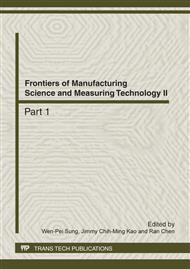p.552
p.556
p.560
p.564
p.568
p.572
p.576
p.582
p.586
Effect of Matching Performance on J-Integral of Inhomogeneous Welded Joints
Abstract:
In this paper, J-integral of 3-zone inhomogeneous welded joint is calculated by use of the finite element method, and the impacts of yield strength matching factor and elastic modulus matching factor on J-integral are studied as well. The analysis results show that the yield strength matching factor affects J-integral value greatly, that is, low matching of inhomogeneous welded joint of same steel can help to improve the ductility of the welded joint and the influence of yield strength matching factor on J-integral is much greater than that of elastic modulus matching factor, so it plays a very important role in the engineering design.
Info:
Periodical:
Pages:
568-571
Citation:
Online since:
April 2012
Authors:
Keywords:
Price:
Сopyright:
© 2012 Trans Tech Publications Ltd. All Rights Reserved
Share:
Citation:


